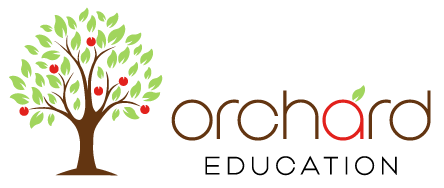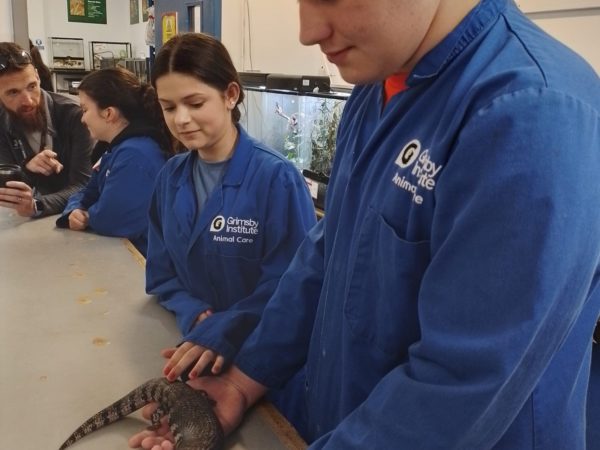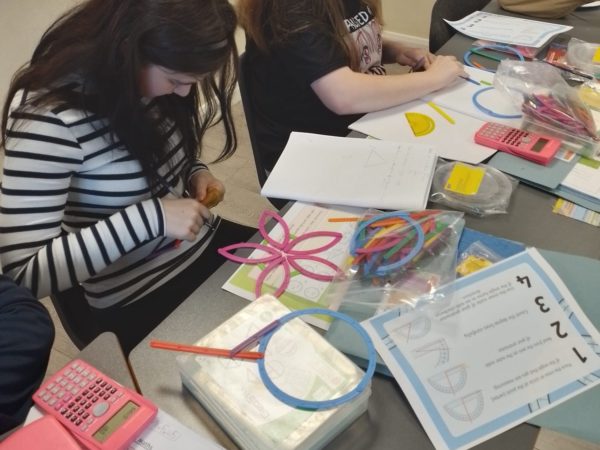Applying for a Place at our School
To join our school, your child must have an Education, Health and Care Plan (EHCP) in place. Learners who are identified as having additional needs but do not yet have an EHCP, will need to undergo the Education, Health and Care Assessment Request (ECHAR) process. If capacity allows, The Orchard may support local authorities, families, and learners in gaining an EHCP by offering a short-term placement whilst all assessments are completed. If, following assessment, a learner is given an EHCP, admission will be considered to The Orchard School in line with our Admissions Policy.
We have a formal admissions procedure which is outlined in our Admissions Policy and which ensures we are able to meet a learner’s needs.
Our school works with learners with a broad range of SEND, including Cognition and Learning, Communication and Interaction, Social Emotional Mental Health, and Sensory and Physical.
Learners can join our school at any time during the school year and will follow a personalised curriculum package to meet their individual needs.
Our caring and committed staff team will spend time getting to know you and your child during a carefully planned transition, to ensure they feel safe, settled, secure, and ready to learn.
Book a personalised tour of our school using our Book a Visit button. Or, alternatively, contact your current provision or Local Authority SEND Co-ordinator for more information about joining our unique and special school.
Learner Case Studies
We love to celebrate our learners’ successes and achievements! We are proud to share with you some of the stories of how the school and our incredible team have supported learners to fulfil their potential.
CM
CM joined The Orchard at our Laceby Road provision in Year 7. CM’s primary needs were identified as Social, Emotional and Mental Health and he also has significant global delays in all areas of functioning.
At his previous school, CM showed high levels of agitation, aggression, anxiety and extreme distress in a classroom setting, meaning he struggled to maintain positive relationships with peers.
When CM joined our school, he was working at bronze level in all subjects. In KS3 he worked hard to achieve his personal aim to progress from bronze to silver level in all subjects. He even completed some gold topics in maths and ICT.
Starting at The Orchard, CM had a fear of computers and became stressed at the thought of ICT. With the support of staff, he has worked hard to change his mind set and shows an eagerness to achieve, together with a new found confidence in his own abilities in ICT.
Writing was another challenge for CM, whose written work was illegible when he joined us in Year 7. Throughout KS3, he completed numerous writing activities and was even motivated to use his own time to undertake additional work in this area. Through this hard work he has progressed from only ever writing in pencil, to writing consistently and legibly in pen.
As a previously reluctant reader, CM has also discovered a love of reading during his time with us. To his mother’s surprise, he even requested a copy of Sir Tom’s biography. His new found enjoyment of reading is reflected in the progress of his writing skills.
To begin with, PE was a big issue for CM and he would not participate in most sports offered at the school. However, with support and encouragement, he now fully engages and actively enjoys taking part in exercise. CM is also now a key member of the school football team who enjoy great success in the SEND league, and which further develops his social skills and team work.
Now in Year 10, CM has progressed to such an extent, that he is accessing the GCSE mathematics and English Language programme and has achieved Entry Level 3 Functional Skills qualifications.
CM has also made huge progress in his personal development. With the support of targeted interventions and our wide range of therapies, emotionally, CM is now able manage all of his fears and anxieties. CM used a worry book that he wrote in regularly which was used to relay his worries to his ‘safe faces’ and allow them to support him. CM’s personal growth, means he now no longer uses his worry book, although it is still available to him. Instead, he is able to rationalise most of his worries without requiring intervention or support. When he is worried about anything, he is able to just talk it through.
CM’s mother has also seen a huge difference in how he manages his emotions at home, reporting that he has developed a solid understanding of empathy and understanding.
As part the school’s personalised learning programme, CM was able to spend time at a small community farm in the local area. He took such an interest in caring for the animals and supporting the local community, that he now volunteers at the farm.
CM was also nominated by the school in the Young Advocate of the Year category of the NASEN Awards 2022.
This award celebrates a young person who through their actions, activism, public communication or other forms of advocacy has raised awareness of; championed acceptance of; and challenged stigma or stereotypes around SEND. Their actions have driven positive change for children and young people with SEND, whatever the scale of their impact, whether in the class, school, local community or beyond. This award celebrates the bravery, determination and creativity of young people who are making a difference in the world, and who are helping to create a more inclusive and brighter future for all.
We were so incredibly proud that CM was a runner up in this category and that he was recognised in this way.
Learner X
Learner X’s primary need is Social, Emotional and Mental Health. Learner X would demonstrate rocking and clenching of his fists in his previous setting when he did not want to engage, however, we have not witnessed this at Robert Street. Learner X can become withdrawn and at times cry when they are experiencing heightened emotions but staff support them by sitting nearby and offering reassurance. They are then able to self-regulate in a matter of minutes.
Learner X has come a long way in managing their emotions during their time at The Orchard. and it is very rare we now have any incidents. Learner X accesses GCSE subjects and engages well. At times, they can be easily influenced but this is very minimal. Learner X engages well in all their lessons and will ask for support when needed.
Learner X is currently in year one of his two year GCSE programme of study for mathematics and English Language. They are currently predicted grades 3 for both subjects. Alongside this, Learner X is completing Functional Skills assessments and has achieved entry level 2 maths and reading and writing at entry level 3. Learner X is registered for entry level 2 ICT. They have also achieved vocational qualifications in, ‘Dealing with problems in everyday life ‘and ‘Environmental awareness’.
Learner X is a lovely learner with excellent manners and a kind nature. They have great relationships with staff and learners. Staff also have a good relationship with Learner X’s mother, and regular contact is made between ourselves and home.
Learner X has recently started to access appointments with Fortis Therapy. They were very dubious about these sessions initially, but have been reassured this is available whenever needed, and Learner X now enjoys these sessions. Learner X is very popular amongst their peers and has made 3 solid friendships within the class.
Since moving to Roberts Street, Learner X has settled well and made great progress. They engage well with lessons and will follow instructions from staff. Overall, Learner X is a happy young person who is well liked and wants to achieve.
Learner Y
Learner Y is a year 10 learner at our Laceby Road site who is in a small KS4 nurture class with three other learners. Learner Y is a polite, respectful member of the school community, with a good sense of humour. Learners look up to Learner Y as a role model due to his calm and mature demeanour.
Learner Y’s primary need is communication and interaction in respect of a diagnosis of ASD. They also have a demand avoidance profile and a diagnosis of ADHD. Learner Y’s EHCP states they had low resilience and poor emotional regulation. Learner Y also has a presentation of SEMH needs, and has diplegic cerebral palsy which means they struggle to be active for long periods due to fatigue.
Learner Y transitioned to The Orchard in year 7 after completing his primary education within a special school setting. They had previously not settled within numerous mainstream educational settings and spent large spells out of formal education. This resulted in large gaps in their educational ability. Prior to joining the Orchard Learner Y had been exposed to lots of educational trauma through negative schooling experiences.
During Learner Y’s transition to Orchard, they were unable to read anything other than their name and their writing ability was limited, with a scribe used predominantly in the classroom. In maths, Learner Y was unable to sequence days, weeks and months. Their confidence was low in relation to all aspects of education.
Learner Y came to the school never having built any lasting friendships before, and struggled to communicate their feelings, emotions and need for support.
On arrival Learner Y was a pre-entry English learner, however, is now able to access the bronze curriculum with support.
Learner Y received phonics interventions in order to up their confidence with phonic knowledge. They completed some sessions with the school’s SENCo and additional sessions with their class tutor. This intervention helped Learner Y to order the alphabet, learn the letter sounds and begin blending CVC words. This also supported Learner Y’s letter recognition and formation, to enable them to start writing for themselves. Visual prompts are used to remember finger spaces, full stops and capital letters.
Learner Y has continued to be supported with reading and can follow text and read short sentences with simple information, allowing him to access the bronze curriculum with support.
Learner Y has also made such strides in mathematics (from entry level 1 to entry level 3), that they are now accessing the GCSE mathematics classes, with access arrangements in place to support reading.
Learner Y demonstrates determination and resilience to overcome academic challenges and despite having cerebral palsy does not allow this to be a barrier to access physical education, which they thoroughly enjoy, especially boxing.
Learner Y now manages their emotions effectively and can verbally communicate to their safe face when feeling heightened and frustrated, to allow a resolution to be found.
This academic year, Learner Y has passed Functional Skills Entry Level 1 in English qualification and Functional Skills Entry Level 3 in mathematics.
The school’s environment, positive relationships and social skills programme have all played a part in Learner Y’s development of social and emotional skills. Furthermore, these skills are embedded within our personalised learning programme out in the local community.
Testimonials
“Caleen has transformed into a confident and more social young man, achieving an impressive 96% attendance – something we never thought remotely possible. He now wakes up to an alarm, gets ready independently and is well on track with his GCSE Maths and English.”
“He has been a different boy at home, spending time and having conversations with us all, and telling us all about his day.”
“Orchard school has literally saved my boy from educational disaster.”
“I got my son moved here and I never realised at the time what a fantastic school I’d chosen.”
“I cannot believe the kindness of this school!”
“Thank you for believing in my son. He is so much more willing to attend school now and so much happier in himself.”
“Wow’! What an amazing set of students and staff you have.”
“Great school and excellent staff.”
“I couldn’t be more pleased with how he’s settled in. It is amazing to see him learning!”
“It’s been a difficult time for the family and the support you have shown has been outstanding.”
“It was a pleasure to talk about Army careers with a very attentive and interactive group of young people.”
“I had a phone call from my son’s teacher about a story he had written. He did her so proud, she actually cried.”
“I had a phone call from my son’s teacher about a story he had written. The school have made my son’s learning fun and this shows as he looks forward to the next day. All staff go above and beyond to support us both. I find myself and Orchard work amazingly well in partnership and this makes me comfortable in contacting any member of the Orchard staff with any problem or worry. I feel listened to and valued. I cannot thank the school enough for all the time and effort invested in showing my son that the team are more than teaching staff, they are a community of support , love and laughter – thank you.”
“he whole team is great and communication and support is excellent!”
“Everyone at the school that I have personally dealt with and that my son talks about are equally exceptional.”
“Staff always keep me updated and are happy to help with whatever I ask of them.”
“All staff go above and beyond.”
“I love working with Orchard learners in our extra-curricular performing arts club. The learners are always happy and staff keen to join in and be part of it with them. A lovely school!”
“Always happy to bring him back after half-term. Alfred loves school. I appreciate school is always accommodating and supportive of his appointments. It is greatly appreciated.”
“The learners took to the training yesterday like budding baristas. They interacted well with the trainer and also with students from other schools. I can honestly say how polite and attentive to detail your learners were, and we hope they continue to use these new skills they have learnt in their new ventures.”





